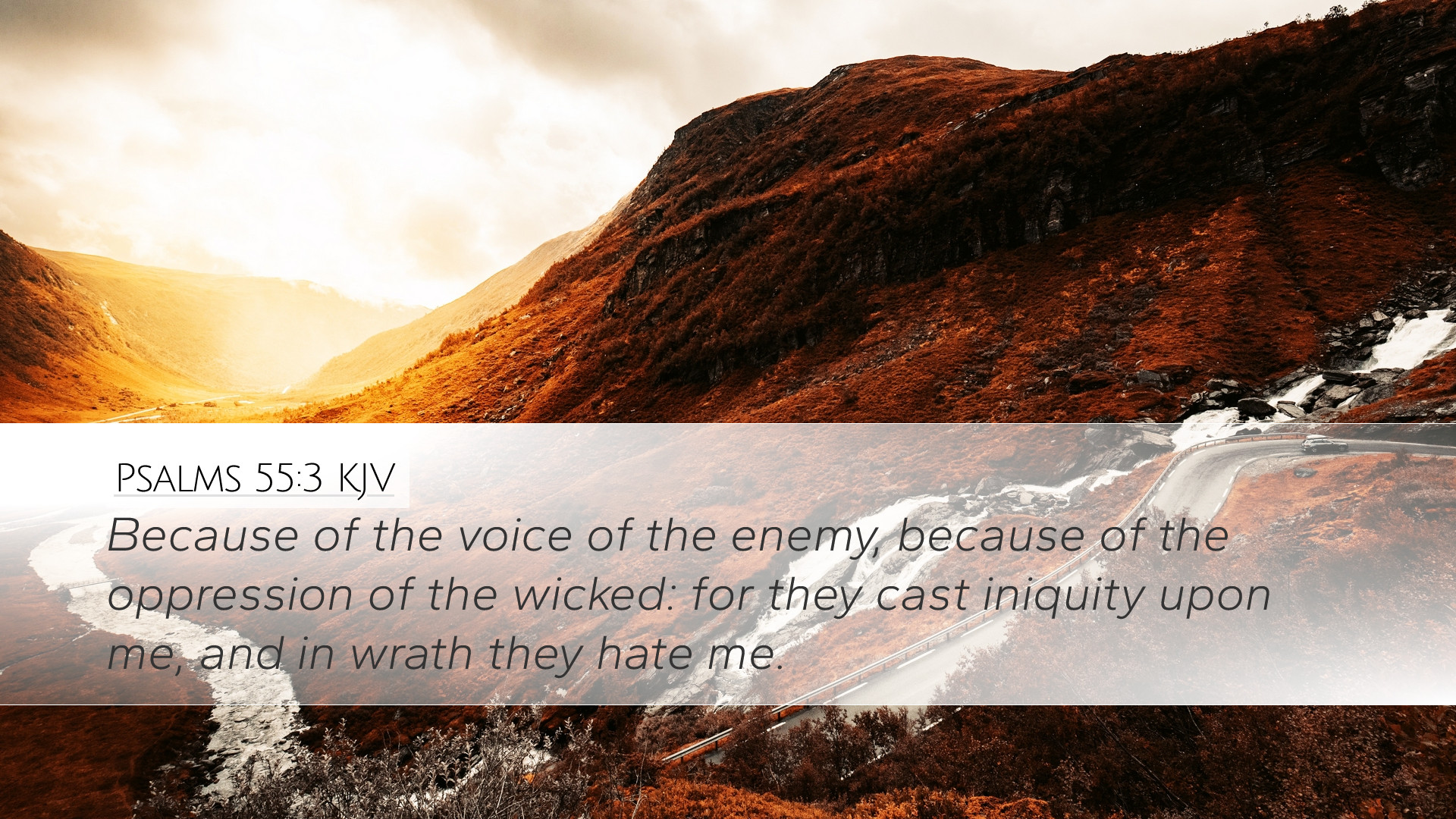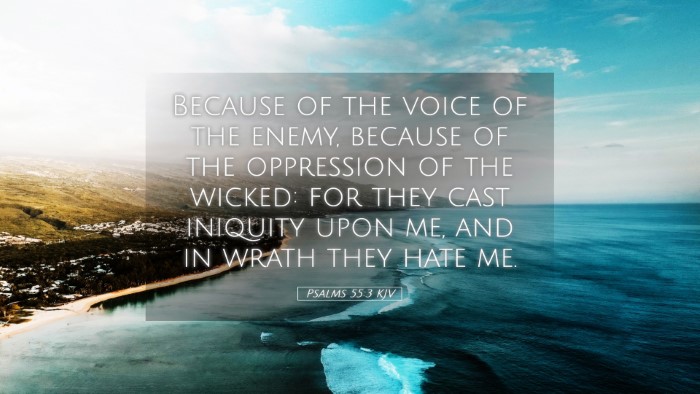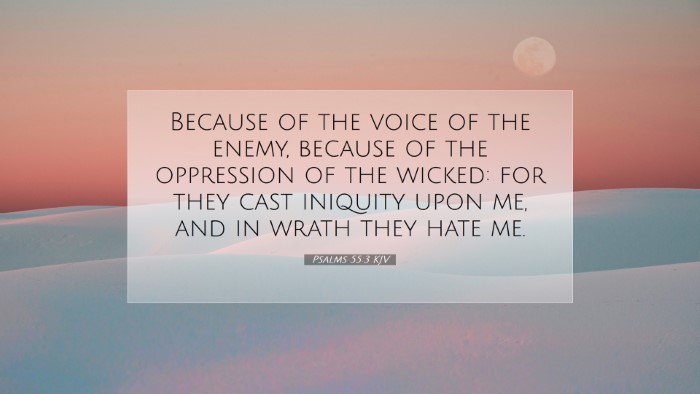Psalms 55:3 - A Commentary
Bible Verse: "Because of the voice of the enemy, because of the oppression of the wicked: for they cast iniquity upon me, and in wrath they hate me." (Psalms 55:3)
Contextual Overview
The Psalms are a rich tapestry of human emotion and divine revelation. Psalm 55, attributed to David, is a poignant composition that captures the essence of distress in the face of betrayal and malice. The particular verse, Psalms 55:3, articulates the anguish caused by external adversities, primarily the malevolent actions of enemies and the psychological torment that ensues. The context of this psalm is essential; David reflects a cultivated sensitivity to emotional and spiritual anguish, portraying both a personal crisis and broader existential threats.
Insights from Public Domain Commentaries
Matthew Henry's Commentary
Matthew Henry emphasizes the dual aspects of suffering as expressed in this verse. He points out that the "voice of the enemy" symbolizes not just physical threats but also the psychological warfare waged through slander and deceit. The expression highlights the seriousness of being surrounded by enemies who act out of malice:
- Emotional Distress: Henry remarks on the profound impact that such enmity has on the soul, suggesting that betrayal is often more painful than open hostility.
- Spiritual Warfare: According to Henry, the phrase "cast iniquity upon me" points towards false accusations and the burden of guilt projected by the wicked, which can lead to a sense of hopelessness in the afflicted.
- Divine Dependence: Ultimately, Henry encourages readers to depend on God amid such trials, indicating that prayer is a vital response to the oppression encountered in life.
Albert Barnes' Notes on the Bible
Albert Barnes expands on the emotional depth and context of David's lament. He focuses on the terms "oppression of the wicked" and their implications. Barnes notes:
- Nature of Oppression: He interprets this as a comprehensive term for the pervasive influence of evil, asserting that the wicked often engage in systematic oppression that leads to significant social and spiritual suffering.
- Deliberation of Enemy's Hatred: Barnes elucidates that this hatred is driven by a conscious choice to inflict harm, acknowledging that the wicked relish in the suffering they cause as a demonstration of their disdain.
- Call for Vindication: Emphasizing both the urgency of David’s cry for help and the nature of God’s justice, Barnes reflects on the psalmist's plea for divine intervention amid such adversity.
Adam Clarke's Commentary
Adam Clarke provides an analytical perspective focused on language and interpretation. He emphasizes the depth of anguish expressed in the verse:
- Voice of the Enemy: Clarke posits that the metaphorical "voice" signifies the whisperings of deceit and persistent negativity that weigh on an individual's spirit, equating it with moral and spiritual conflict.
- Iniquity and its Burden: He offers insight into the notion of iniquity being cast upon David, which he interprets as the heavy load of sin perceived as placed upon him, intensifying his suffering.
- Divine Assurance: Clarke concludes by asserting that even amidst such dire circumstances, the psalm illustrates a profound trust in God’s eventual intervention, reinforcing the need for believers to seek solace in the divine presence.
Thematic Implications
Psalms 55:3 offers deep theological reflections relevant for pastors, students, and scholars alike, including:
- The Nature of Human Conflict: This verse serves as a reminder of the reality of human relationships and the threats posed by individuals motivated by evil. Acknowledgment of this theme is essential in pastoral care and counseling.
- Understanding Spiritual Warfare: The articulation of suffering due to uncaring wickedness opens a crucial discourse on spiritual warfare and the daily battles faced by believers. Recognizing this aspect can deepen understanding in teaching and community support.
- The Response of Prayer: The call to communicate one's pain and distress to God is an everlasting theme in scripture. This encourages a model of prayer that is earnest, reflective, and intimately connected to our community struggles.
- Movement Toward Hope: Ultimately, there is an implicit hope woven throughout the narrative of David’s complaint that God responds to the cries of his people, highlighting the importance of hope in the life of faith.
Conclusion
The profound insights derived from Psalms 55:3, as elucidated by the commentaries of Matthew Henry, Albert Barnes, and Adam Clarke, provide a multi-dimensional understanding of the verse. From the emotional strain of feeling oppressed to the ultimate reliance on divine intervention, each commentator adds to an enriched understanding beneficial for current theological discussions. For pastors, students, and scholars, the themes of human suffering, the reality of spiritual conflict, and the transformative power of prayer resonate deeply, serving as both a challenge and comfort in their faith journeys.


